人教版八年级英语下册第3单元
新人教版八年级英语(下册)第三单元知识点总结归纳

新人教版八年级英语(下册)第三单元知识点总结归纳Unit 3: Could you please clean your room?One: "Peter。
could you please take out the rubbish?" - "Sure。
Mom."Could you please do something?" is used to make a request in a polite and indirect manner。
hoping for a positive response。
"Could" is not the past tense of "can," but a more polite way of speaking。
The answer should use "can."Common affirmative responses: "Sure," "Of course," "Certainly," "No problem." Negative responses: "Sorry。
I can't."Two: "Take out" means to remove something (v+adv)。
When using a pronoun as the object。
it goes in the middle。
Witha noun。
it can go in the middle or at the end.Phrases using "take":Take out" means to bring something out or remove it.Please take out a piece of paper."Please take it out."Take。
人教版丨八年级下册英语3单元知识点总结

人教版丨八年级下册英语3单元知识点总结Unit3 Could you please clean your room?【重点单词】rubbish [ˈrʌbɪʃ] n. 垃圾,废物take out the rubbish 倒垃圾fold [fəʊld] v. 对折,折叠mess [mes] n. 混乱,脏乱,食堂throw [θrəʊ] v. 扔,投掷all the time 频繁,反复neither [ˈni:ðə] pron.adv. 二者都不;也不shirt [ʃə:t] n. 运动衫,衬衫as soon as 一…就…,尽快pass [pɑ:s] v. 前行,经过,批准borrow ['bɒrəʊ] v. 借,借用lend [lend] v. 借给,借出finger [ˈfiŋgə(r)] n. 手指hate [heɪt] v. 憎恶,讨厌chore [tʃɔ:(r)] n. 杂务,乏味的工作while [wail] conj. 当...时候,而,然而snack [snæk] n. 小吃,点心,快餐stress [stres] n. 精神压力,心理负担waste [weɪst] v. 浪费,消耗in order to 目的是,为了provide [prə'vaid] v. 提供,供给,供应anyway [ˈeniwei] adv. 无论如何,不管怎样,而且depend [diˈpend] v. 取决于,依靠,依赖depend on 依靠于develop [dɪˈveləp] v. 发展,壮大,开发,研制independent [ˌindiˈpendənt] adj. 独立自主的,不受约束的independence [ˌɪndɪ'pendəns] n. 独立fair [fɛə] adj. 公平的,公正的unfair [ˌʌnˈfeə] adj. 不公平的,有偏见的fairness [ˈfeənɪs] n. 公正性,合理性since [sɪns] conj. 因为,既然neighbor [ˈneɪbə] n. 邻居take care of 照顾,处理ill [il] adj. 生病的,有病的drop [drɔp] v. 落下,跌落【重点短语】1.go out for dinner 出去吃饭2.stay out late 在外面待到很晚3.go to the movies 去看电影4.get a ride 搭车5.work on 从事6.finish doing sth. 完成做某事7.clean and tidy 干净整洁的8.do the dishes 洗餐具9.take out the rubbish 倒垃圾10.fold your/the clothes 叠衣服11.sweep the floor 扫地12.make your/the bed 整理床铺13.clean the livng room 打扫客厅14.no problem 没问题15.welcome sb. 欢迎某人e home from school/work放学/下班回家17.throw down 扔下18.sit down 坐下e over 过来20.take sb. for a walk 带某人去散步21.all the time 一直;总是22.all day/evening 整曰/夜23.do housework 做家务24.shout back 大声回应25.walk away 走开26.share the housework 分担家务27.a comfortable home 一个舒适的家28.in surprise 惊讶地29.get something to drink 拿点喝的东西30.watch one show 观看一个节目31.hang out 闲逛32.pass sb. sth. 把某物传给某人33.lend sb. sth. 把某物借给某人34.get sth. wet 使某物弄湿35. hate to do sth. 讨厌做某事36.do chores 做杂务37.help sb. (to ) d o /with sth.帮助某人干某事38.bring a tent带顶帐篷来39.buy some snacks买些小吃40.go to the store去商店41.invite sb. to a party邀请某人参加聚会42.make sb. do sth. 使某人做某事43.enough stress足够的压力44.a waste of time浪费时间45.in order to为了46.get good grades取得好成绩47.mind doing sth. 介意做某事48.depend on依赖;依靠49.develop children ’s independence发展孩子的独立性50.look after/take care of 照顾;照看51.do one’s part in (doing ) sth. 做某人分内的事【重点句型】1.Could you please clean your room?你能打扫一下你的房间吗?2. I have to do some work. 我必须干些活。
人教版初中八年级英语下册第三单元Unit 3 教案含教学反思

Section A 单词rubbish n.垃圾;废弃物fold v.折叠;对折sweep v.(swept)扫;打扫floor n.地板mess n.杂乱;不整洁throw v.(threw)扔;掷neither adv.也不; pron.两者都不shirt n.衬衫pass v.给;递;走过;通过borrow v.借;借用lend v.(lent)借给;借出finger n.手指hate v.厌恶;讨厌while conj.与……同时;当……的时候;而;然而chore n.杂务;乏味无聊的工作snack n.点心;小吃;快餐短语take out the rubbish 倒垃圾all the time频繁;反复as soon as 一……就……句型1.Peter,could you please take out the rubbish? 彼得,你能把垃圾倒了吗?2.And she won’t be happy if she sees this mess.而且如果她看到这么乱,她会不高兴的。
3.Could I at least finish watching this show?至少等我看完这个节目可以吗?4.For one week, she did not do any housework and neither did I.在—周时间里,她没有做任何家务,我也没有做。
that everyone should do their part in keeping it clean and tidy.既然他们和父母生活在同一所房子里,他们就应该知道每个人都应该为保持房屋的干净和整洁尽一份力。
5.The earlier kids learn to be independent,the better it is for theirfuture.孩子们越早学会独立,对他们的未来就越好。
语法情态动词could的用法掌握本单元中的重点词汇及相关短语,并灵活运用。
人教版英语八年级下册第三单元知识点归纳
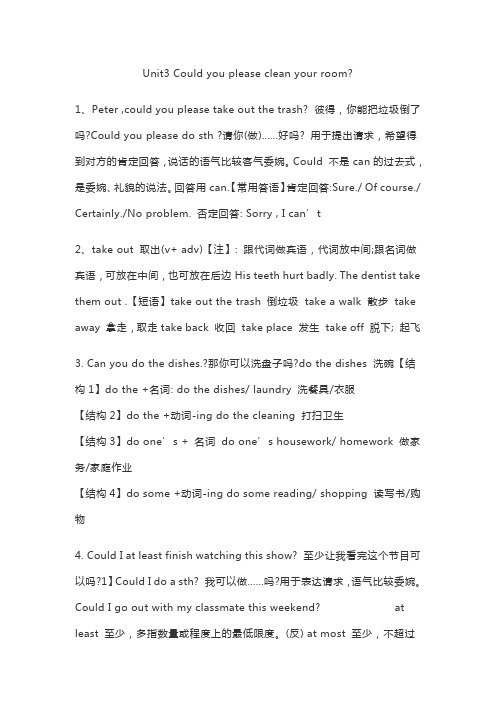
Unit3 Could you please clean your room?1、Peter ,could you please take out the trash? 彼得,你能把垃圾倒了吗?Could you please do sth ?请你(做)......好吗? 用于提出请求,希望得到对方的肯定回答,说话的语气比较客气委婉。
Could 不是can的过去式,是委婉、礼貌的说法。
回答用can.【常用答语】肯定回答:Sure./ Of course./ Certainly./No problem. 否定回答: Sorry , I can’t2、take out 取出(v+ adv)【注】: 跟代词做宾语,代词放中间;跟名词做宾语,可放在中间,也可放在后边His teeth hurt badly. The dentist take them out .【短语】take out the trash 倒垃圾take a walk 散步take away 拿走,取走take back 收回take place 发生take off 脱下; 起飞3.Can you do the dishes.?那你可以洗盘子吗?do the dishes 洗碗【结构1】do the +名词: do the dishes/ laundry 洗餐具/衣服【结构2】do the +动词-ing do the cleaning 打扫卫生【结构3】do one’s + 名词do one’s housework/ homework 做家务/家庭作业【结构4】do some +动词-ing do some reading/ shopping 读写书/购物4.Could I at least finish watching this show? 至少让我看完这个节目可以吗?1】Could I do a sth? 我可以做......吗?用于表达请求,语气比较委婉。
人教版八年级英语下册Unit3单元课件

词语辨析:sweep and clean sweep一般指用扫帚、刷子等把表面的灰尘、
污物清除掉这一动作,多用于扫地。
I sweep the floor every day.我每天扫地。 clean表示用各种方式打扫干净,用得比较
广泛。
Please clean the blackboard.请把黑板擦干净。
floor n 地板,楼层 on the floor 在地上
There weren’t any chairs,so we sat on the floor. 屋子里没有椅子,因此我们就坐在地上了。
美式:一楼 the first floor; 二楼 the second floor; 三 楼 the third floor 英式:一楼 the ground flood; 二楼 the first floor; 三楼 the second floor 以此类推
√ stay out late. Yes no
I need to eat breakfast.
√ get a ride. Yes no
You have a basketball game.
2b Listen again. Why does Peter’s father say “no”? Draw lines to the reasons in
I was writing a letter while Mom was watching TV
妈妈在看电视的时候,我在写信。
When,表示瞬间,也可以表示一段时间,主句和从 句的动作可以同时发生可以向后发生,when 引导的 时间状语从句的谓语动词一般是非延续性的动词。
I was having the piano lesson when he came in .
最全面人教版八年级下册英语第三单元知识点归纳总结

Unit 3 Could you please clean your room?一、词汇与短语◆重点单词A部分1.rubbish 垃圾;废弃物n.2.pass 给;递;走过;通过v. 3.fold 折叠;对折v.4.borrow 借;借用v.5.sweep 扫;打扫v.6.lend 借给;借出v.7.floor 地板n.8.finger 手指n.9.mess 杂乱;不整洁n.10.hate 厌恶;讨厌v.11.throw 扔;掷v.12.chore 杂务;乏味无聊的工作n. 13.neither adv.也不pron.两者都14.while 当……的时候;而;然而conj. 15.shirt 衬衫n.B部分1.snack 点心;小吃;快餐n.2.fairness 公正性;合理性n.3.stress 精神压力;心理负担n.4.since 因为;既然conj.从……以后;自……以来prep. , conj.&adv.5.waste n.浪费;垃圾v.浪费;滥用6.neighbor(=neighbour) 邻居n. 7.provide 提供;供应v.8.ill 有病;不舒服adj. 9.anyway 而且;加之adv.10.drop 落下;掉下v. 11.depend 依靠;信赖v.12.independent 独立的;自主的adj. 13.develop 发展;壮大v.14.fair 合理的;公正的adj. 15.independence 独立n.16.unfair 不合理的;不公正的adj.◆重点短语A部分1.take out the rubbish 倒垃圾2.no problem 没问题3.make the bed 铺床4.go out for dinner 出去吃晚饭5.fold one's clothes 叠衣服6.go to the movies 去看电影7.do the dishes 洗餐具8.stay out late 待在外面很晚9.as soon as/the minute 一……就……10.get a ride 搭便车11.all the time 频繁;反复12.work on 从事13.want sb. to do sth. 想让某人做某事14.be back from shopping 购物回来15.finish doing sth. 做完某事16.any minute 随时17.help out with sth. 帮忙做某事18.pretty clean and tidy 很干净整洁19.all day 整天20.shout back 顶嘴21.take sb. for a walk 带某人去散步22.walk away 走开23.in front of 在……前面24.in surprise 吃惊地25.throw down 扔下26.hang out with sb. 和某人闲逛27.come home from school 放学回家28.borrow sth. from sb. 向某人借某物29.solve the problem 解决问题30.lend sth. to sb. 把某物借给某人31.be angry with sb. 生某人的气32.come home from work 下班回家33.hate to do sth. 讨厌做某事B部分1.in order to 目的是;为了2.mind doing sth. 介意做某事3.depend on 依靠;信赖4.get sth. for sb. 为某人买某物5.help with sth. 帮忙做某事6.the idea of fairness 公平的想法7.make sb. do sth. 使/让某人做某事8.do one's part in 尽某人的责任9.have a test 进行测验10.have no idea 不知道11.invite sb. to sp. 邀请某人去某地12.as a result 结果13.take care of 照顾;处理14.look after/care for 照看;照顾15.have enough stress from school 有足够的学习压力16.spend one's time on/doing sth.花费某人的时间做某事17.a waste of time 浪费时间18.fall ill 生病19.provide sth. for sb.=provide sb. with sth.给某人提供某物20.develop children's independence 发展孩子的独立性21.get into a good university上一所好大学22.agree with sb. 同意某人◆重点句子A部分1.— Could you please clean your room? — No problem.— 你能整理一下你的房间吗?— 没问题。
Unit 3 词汇讲解课件人教版英语八年级下册
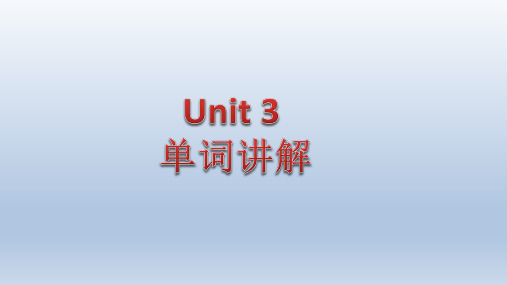
The temperature will drop/fall in the night. drop n. 滴,水滴 a drop of 一滴… Eg: The big drops of rain fell/dropped on his head.
You can borrow some money from your parents. He refused to lend me his dictionary. You can keep the book for two weeks.
drop-dropped-dropping (及物/不及物v. ) = fall (不及物v) 落下/降落/下降
while conj 当…时(when),与…同时 while: 一般指一段时间,谓语动词用延续性v
常用进行时 when: 可指瞬间,也可指一段时间,谓动瞬间/延续
常用一般时
Eg:I came home while/when Mom was cooking. = While/When Mom was cooking, I came home. = When I came home, Mom was cooking. I was doing my homework while Mom was reading.
常用短语:
drop in on sb 顺便拜访某人 drop in at sp顺便拜访某地 drop by 顺便拜访 drop down 落下 drop out 退学
hate: = dislike ---like/love 不用于进行时 hate doing sth(经常性) hate to do sth (一次性) 讨厌做某事 Eg: I hate rainy days.
人教版八年级英语下unit3重点短语及句型总汇+配套练习(附语法)

八年级下册复习学案Unit 3 What were you doing when the UFO arrived?一年级英语组吕书林一.重点短语1.in front of 在,,的前面(外部)in the front of 在,,的前面(内部)2.sleep late 睡懒觉sleep well 睡得好get to sleep=fall asleep 睡着3.walk down/along 沿,,走4.take off (飞机)起飞;脱下(衣帽)5.run away 跑开,逃跑6.buy/draw/make sth. for sb. 为某人买/画/制作7.in history 在历史上8.take place 发生(强调必然性)9.happen to sth./sb. 发生(强调偶然性)例如:What has happened to you?=What’s the matter with you?=What’s wrong with you?10.all over the world=around the world 遍及全世界11.next to 相邻,紧贴12.close to 接近于;在附近13.be ill in hospital/bed 生病住院/在床14.hear about/of 听说(间接听到)15.in silence 沉默不语keep silent 保持沉默16.an unusual experience 一次不寻常的经历17.have difficulty doing sth 干某事有困难18.have meaning to 对….有意义本单元目标句型:..?1.What were you doing when…2.I was doing sth. When+一般过去时的时间状语从句...3.While sth./sb. was doing sth., I was doing sth....Eg. What were you doing when the UFO landed?当不明飞行物着陆时,你正在干啥?While my mother was cooking, I was watching TV.当妈妈正在做饭时,我在看电视。
八年级下册人教版英语Unit3_Could_you_please_clean_your_room课件
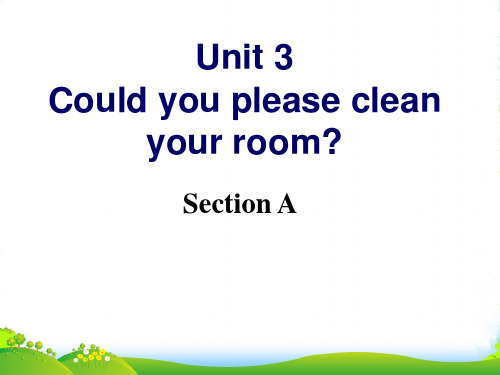
2. have to有人称、数、时态的变化, 而must只有一种形式。但must 可 用于间接引语中表示过去的必要 或义务。
He had to look after his sister yesterday.
3. 在否定结构中: don’t have to 表示 “不必”, mustn’t 表示“禁止”。 You don’t have to tell him about it. 你不一定要把此事
√
room
1c Pairwork
A: Could you please sweep the floor? B: Yes, sure. / I’m sorry, but I’m
reading the newspaper.
2a Listening and check “yes” or “no”.
have to和must
1. 两词都是 “必须”的意思, have to 表示客观的需要, must 表示 说话人主观上的看法, 既主观 上的必要。
My brother was very ill, so I had to call the doctor in the middle of the night. 我弟弟病得很厉害,我只得半夜里 把医生请来。(客观上需要做这件事) He said that they must work hard. 他说他们必须努力工作。 (主观上要做这件事)
cooking. I _c_a_n_ come later. 2. - _M__u_st_ we clean the windows today?
- No, you _n_e_e_d_n_’_t. You __c_a_nclean them tomorrow.
3. - _M__a_y I watch TV this evening, mum? - No, you _m_u__st_n_’_t. Work _m__u_s_t come first.
人教版八年级下册英语第三单元知识点

人教版八年级下册英语第三单元知识点Unit 3 Could you please clean your room?一、重点短语1.go out for dinner出去吃饭2.stay out late在外面待到很晚3.go to the movies去看电影4.geta ride搭车5.work on从事6.cleanand tidy干净洁7.do the dishes洗餐具8.takeout the rubbish倒垃圾9.fold your/the clothes叠衣服10.sweepthe floor扫地11.make your/the bed整理床铺12.cleanthe living room打扫客厅13.no problem没问题14.welcomesb.欢迎某人e home fro m school/work放学/下班回家16.throw down扔下17.sit down坐下eover过来19.take sb.for a walk带某人去散步20.all the time总是21.all day/evening整日/夜22.dohousework做家务23.shout back大声回应24.walkaway走开25.a comfortable home一个舒适的家26.share the housework分担家务27.get some thing to drink拿点喝的东西28.insurprise惊讶地29.watch one show观看节目30.hangout闲逛31.pass sb.sth.把某物传给某人32.lend sb.sth.把某物借给某人33.get sth.wet使某物弄湿34.hate to do sth.讨厌做某事35.help sb.to do/with sth帮助某人干某事36.do chores做杂务37.bring a tent带顶帐篷来38.buy some snacks买些小吃39.invite sb to a party邀请某人参加聚会40.go to the store去商店41.make sb.do sth使某人做某事42.enough stress足够的压力43.a waste of time浪费时间44.inorder to为了45.get goodgrades取得好成绩46.minddoing sth.介意做某事47.developchildren’s independence发展孩子的独立性48.dependon依赖49.do ones part in(doing)sth.做某人分内的事50.look after/take care of 照顾;51.finish doing sth.完成做某事二、知识点解析1.“Could you please do sth.?”的答语以下两种情况:接受请求时可以用Yes,sure./Sure./Of course./Certainly./No problem./My pleasure./It’s my pleasure./With pleasure.等来回答拒绝请求时可以用Sorry./Sorry,I can’t.等来回答,还可以用Ihave to do sth.来解释其否定句是:“Could youplease not do sth.?”2.有关“家务劳动”有关的短语:takeout the rubbish/trash倒垃圾foldone’s clothes叠衣服sweepthe floor扫地cleanthe room打扫房间makeone’s/the bed铺床dothe dishes/wash the dishes洗餐具3.throw down扔下throwat扔向,掷向throw away扔掉例题:Recycling is good,so don’t__________bottles or newspapers.A.find outB.hand ine upD.throw away4.the minute表示“一…….就……”,相当于as soon as.(引导时间状语从句)e.g.:I’ll tell himthe minute he gets there.5.常见time的短语:all the time一直,总是at times不时,有时in time及时on time按时forthe first time第一次in no time立刻at any time随时bythe time到...的时候atthe same同时have a good/great/wonderful time玩的愉快例题:---Hurry up.It’s almost time for school.---Don’t worry.We are sure to be atschool__________.A.at timesB.on timeC.all the timeD.by the time6.as….as表示“和……一样”,之间要用形容词或副词的原级。
人教版英语八年级下册 Unit 3 课文解读(含单词、短语等)
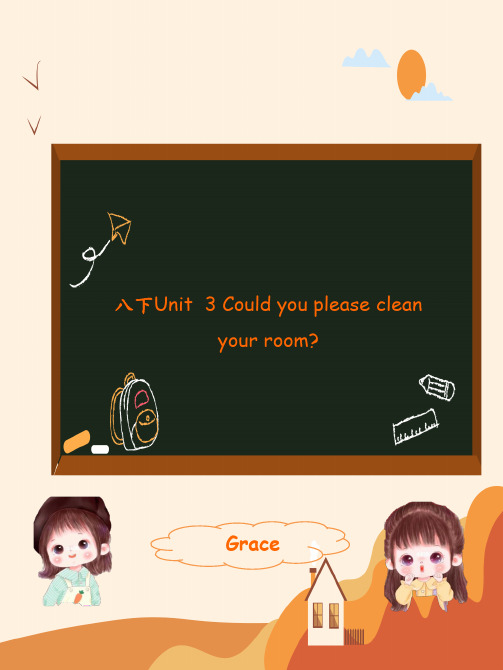
BSroetchtieorn: FAin(e2.dW) h中a英t d文o you want me to do? Sister: Could you take out the rubbish, fold the clothes and do the dishes?
3. all the time
一直;总是=always 常见的含all的短语: after all 毕竟,终究;all in all 总而言之 all over 遍及;not … at all 一点也不 all of a sudden 突然;first of all 首先 above all 最重要的是;in all 总共,共计
八下Unit 3 Could you please clean your room?
Grace
八下Unit 3 Section A (2d)
Sister: Tony, could you please help out with a few things?
Brother: Could I at least finish watching this show?
Brother: So much?
Sister: Yes, because Mom will be back from shopping any minute now. And she won't be happy if she sees this mess.
Brother: But the house is already pretty clean and tidy!
“Well, I work all day at school, too! I'm just as tired as you are!” I shouted back. “哦,我在学校也学习一天了!我和你一样累!”我大喊着回应道。
人教版八年级下册英语 Unit 3 单元知识点总结(含练习题及答案)
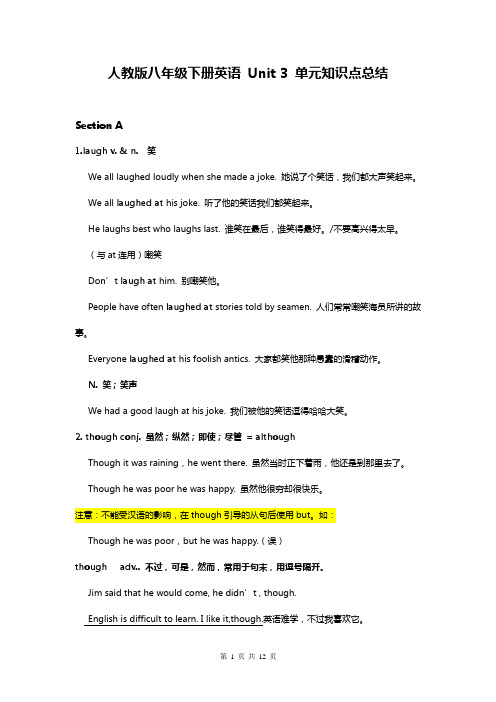
人教版八年级下册英语Unit 3 单元知识点总结Section Augh v. & n. 笑We all laughed loudly when she made a joke. 她说了个笑话,我们都大声笑起来。
We all laughed at his joke. 听了他的笑话我们都笑起来。
He laughs best who laughs last. 谁笑在最后,谁笑得最好。
/不要高兴得太早。
(与at连用)嘲笑Don’t laugh at him. 别嘲笑他。
People have often laughed at stories told by seamen. 人们常常嘲笑海员所讲的故事。
Everyone laughed at his foolish antics. 大家都笑他那种愚蠢的滑稽动作。
N. 笑;笑声We had a good laugh at his joke. 我们被他的笑话逗得哈哈大笑。
2. though conj. 虽然;纵然;即使;尽管= althoughThough it was raining,he went there. 虽然当时正下着雨,他还是到那里去了。
Though he was poor he was happy. 虽然他很穷却很快乐。
注意:不能受汉语的影响,在though引导的从句后使用but。
如:Though he was poor,but he was happy.(误)though adv.. 不过,可是,然而,常用于句末,用逗号隔开。
Jim said that he would come, he didn’t , though.English is difficult to learn. I like it,though.英语难学,不过我喜欢它。
3. quietly轻声地,安静地,平静地quiet轻声的,安静的,平静的The students walked to a quiet place.同学们向一个安静的地方走去。
Unit3 单元知识点总结课件--八年级英语下册(人教版)

A.return back
B.return
C.give
4. —— Last week I ____________ a CD ____________ my neighbor.
—— You shouldn’t ____________ it ____________ Xiao Wang.
A. borrowed; from; lend; to B. lent; from; borrow; to
2.5 drop
v. 落下;掉下;降低 (drop- dropped-dropped- dropping)
The glass dropped and broken. Be careful not to drop the glass. drop by 顺便拜访
n. drop 滴,水珠 A drop of water 一滴水
—— ________. I’m going to do my homework.
A. Sorry, I can’t
B. No, I couldn’t
C. Yes, you can
D. Never
3. Would you please _______ the children ______ on the street?
(in)dependent adj. (不)独立的
China is a dependent country.
2.2 provide
provide
✓ provide sb. with sth. ✓ provide sth. for sb.
提供某人某物
I provided some food for him. I provided him with some food.
Unit3单词课件人教版英语八年级下册

9.pass v.给;递;走过;通过
He passed me the magazine. pass sb. sth.=pass sth. to sb. =He passed the magazine to me.
走过;通过 Cars were unable to pass the narrow road. 及格;合格 She passed the exam. (时间)过去;流逝 The days passed slowly.
10.borrow&lend
【语境串记】 Nick borrowed a book from the library and he lent it to me. He told me that I could keep it for a week.
lend sth. to sb.=lend sb. sth.
Unit3 Could you please clean
your room?
<words>
1.rubbish [U] 垃圾;废弃物
a rubbish bin
垃圾桶
take out the rubbish 倒垃圾
【典例】How terrible the rubbish smells! Please ______ when you go out. A.take it out B.take out it C.take them out D.take out them
16.depend v. 依靠;信赖 independence n.独立
independent adj.独立的
① The little boy depends on his mother very much. “依靠;信赖”,主语通常是表示人的名词或代词。
人教版八年级下册英语第3单元Unit 3 语法知识点提纲

人教版八年级下册英语第3单元Unit 3 语法知识点提纲Unit 3 Could you please clean your room?一.重点词汇1.Rubbish n. 垃圾;废弃物该词为不可数名词。
同义词有:waste, trash, garbage,litter 2.Take ou the rubbishTake out v. 带出去,取出;除掉,拔出该词组的宾语如果是代词(it/them)时,代词要放在take和out 之间。
3.Fold v. 折叠;对折unfold v. 展开;呈现4.Mess n. 杂乱;不整洁[常见搭配] be in a mess 乱七八糟,处境困难;凌乱Messy adj. 凌乱的;使不整洁的5.Throw v. 扔;掷threw (过去式)[常见搭配] throw away 扔掉,丢弃throw out 扔掉;伸出;说出throw into 扔进;使...(突然)陷入6.Neither adv. 也不;pron. 两者都不[用法](1)”neither/nor + 情态动词/助动词/be动词+ 主语”是一个倒装结构,表示前句的否定情况也适应于后面的人或物。
该结构中的助动词,情态动词,be动词形式必须与前面句子的谓语动词时态,以及后面句子的主语的人称和数保持一致。
例如:Mary can’t play the guitar, neither can her sister.I don’t like this book, neither does Tom.(2)Neither (of) + n. 作主语时,谓语动词用单数。
例如:Neither of the two boys likes playing football.Neither answer is right.(3)Neither...nor... 既不...也不...当链接两个并列主语时,谓语动词通常要与nor后面的名词或代词在人称和数上保持一致,即该结构要用就近原则。
人教版八下英语第三单元Unit 3 知识点归纳

Unit3 Could you please clean your room?重点知识归纳一、短语归纳1.go out for dinner 出去吃饭2.stay out late 在外面待到很晚3.go to the movies 去看电影4.get a ride 搭车5.work on 从事6.finish doing sth. 完成做某事7.clean and tidy 干净整洁的8.do the dishes 洗餐具9.take out the rubbish 倒垃圾10.fold your/the clothes 叠衣服11.sweep the floor 扫地12.make your/the bed 整理床铺13.clean the living room 打扫客厅14.no problem 没问题15.welcome sb. 欢迎某人e home from school/work放学/下班回家17.throw down 扔下18.sit down 坐下e over 过来20.take sb. for a walk 带某人去散步21.all the time 一直;总是22.all day/evening 整日/夜23.do housework 做家务24.shout back 大声回应25.walk away 走开26.share the housework 分担家务27.a comfortable home 一个舒适的家28.in surprise 惊讶地29.get something to drink 拿点喝的东西30.watch one show 观看一个节目31.hang out 闲逛32.pass sb. sth. 把某物传给某人33.lend sb. sth. 把某物借给某人34.get sth. wet 使某物弄湿35. hate to do sth. 讨厌做某事36.do chores 做杂务37.help sb. (to ) do /with sth.帮助某人干某事38.bring a tent带顶帐篷来39.buy some snacks买些小吃40.go to the store去商店41.invite sb. to a party邀请某人参加聚会42.make sb. do sth. 使某人做某事43.enough stress足够的压力44.a waste of time浪费时间45.in order to为了46.get good grades取得好成绩47.mind doing sth. 介意做某事48.depend on依赖;依靠49.develop children ’ s independence发展孩子的独立性50.look after/take care of 照顾;照看51.do one’ s part in (doing ) sth. 尽某人的职责二、用法归纳1.finish doing sth. 做完某事2.want sb. to do sth. 想要某人做某事3.try (not) to do sth. 尽力(不)做某事4.let sb. do sth. 让某人做某事5.spend......(in) doing sth. 花费......做某事6.mind doing sth. 介意做某事7.learn to do sth. 学习做某事8.learn how to do sth. 学习怎样做某事9.The +比较级,the+比较级越......,就越.....三、词句精讲1.Could you please take out the rubbish? 你能把垃圾倒了吗?Could you please do sth ?请你(做)......好吗?用于提出请求,希望得到对方的肯定回答,说话的语气比较客气委婉。
人教八年级英语下册第3单元重点知识总结归纳及练习
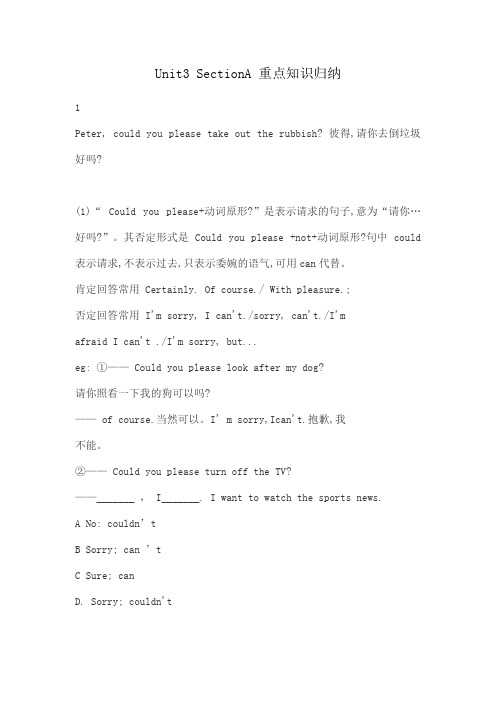
Unit3 SectionA 重点知识归纳1Peter, could you please take out the rubbish? 彼得,请你去倒垃圾好吗?(1)“ Could you please+动词原形?”是表示请求的句子,意为“请你…好吗?”。
其否定形式是 Could you please +not+动词原形?句中 could 表示请求,不表示过去,只表示委婉的语气,可用can代替。
肯定回答常用 Certainly. Of course./ With pleasure.;否定回答常用 I'm sorry, I can't./sorry, can't./I'mafraid I can't ./I'm sorry, but...eg: ①—— Could you please look after my dog?请你照看一下我的狗可以吗?—— of course.当然可以。
I' m sorry,Ican't.抱歉,我不能。
②—— Could you please turn off the TV?——_______ , I_______. I want to watch the sports news.A No: couldn’tB Sorry; can ’tC Sure; canD. Sorry; couldn't解析:我们可用“情景交际法”解答本题。
由答语中“我想看体育新闻”可知“我”拒绝了对方关上电视的请求,故排除C项; Could you please 的否定答语中用can’t,不能用 couldn't,故选B。
答案:B(2) take out意为“带出去;取出;拔出;除掉”,是“动词+副词”结构的短语。
名词作其宾语时放在out前后都可以;代词作其宾语时,须放在out 前。
eg: Please take out a plece of paper.=Please take a pieceof paper out.请拿出一张纸来。
人教版八年级英语下册第三单元(同步优秀教学案例)

3.教师提醒学生进行自我反思,总结自己在学习过程中的优点和不足,鼓励学生不断改进,提高自己的学习能力和水平。
本节课的教学内容与过程注重学生的参与和实践,通过导入新课、讲授新知、学生小组讨论、总结归纳和作业小结等环节,全面提高学生的知识与技能、过程与方法、情感态度与价值观。教师以学生为中心,关注学生的实际需求和个性化发展,营造积极、活泼的课堂氛围,激发学生的学习兴趣和潜能。
(二)讲授新知
1.教师介绍本节课的主题“What's the matter?”,引导学生学习相关的词汇和句型,如“ill, have a cold, have a fever, go to the doctor, medicine”等。
2.教师通过示例和练习,讲解如何使用一般现在时和一般过去时描述病情和给出建议,让学生在课堂上充分理解和掌握。
2.模拟情境:设计角色扮演活动,让学生模拟在医院就诊的场景,运用所学词汇和句型进行交流,增强学生的实践操作能力和语言运用能力。
3.生活情境:结合学生的生活经验,引导学生谈论自己和身边的人发生的疾病情况,让学生在真实的情境中学习并运用所学知识。
(二)问题导向
1.设计问题:教师提出引导性问题,如“当你生病时,你会怎么做?”、“你如何关心他人?”等,引导学生思考和讨论,激发学生的学习动力。
二、教学目标
(一)知识与技能
1.学生能够掌握并正确运用本单元所学词汇,如“ill, have a cold, have a fever, go to the doctor, medicine”等,以便在实际情景中进行流畅的英语交流。
2.学生能够熟练运用本单元所学句型,如“What's the matter with you?”, “I have a ...”, “You should ...”等,进行询问病情、描述病情和给出建议的表达。
八下英语第三单元笔记人教版
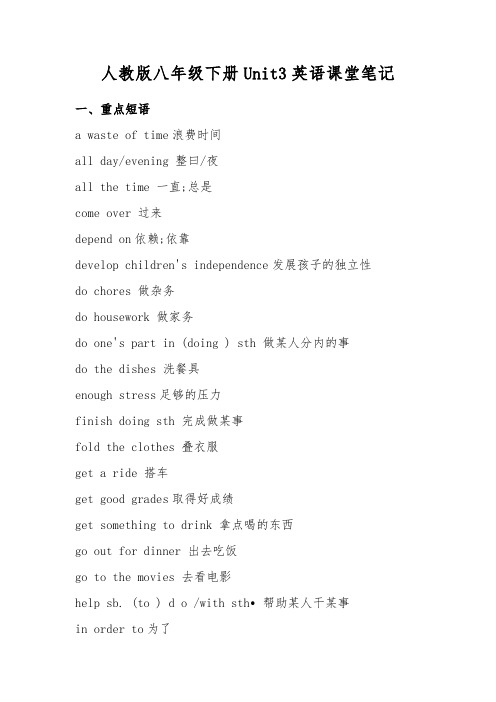
人教版八年级下册Unit3英语课堂笔记一、重点短语a waste of time浪费时间all day/evening 整曰/夜all the time 一直;总是come over 过来depend on依赖;依靠develop children's independence发展孩子的独立性do chores 做杂务do housework 做家务do one's part in (doing ) sth 做某人分内的事do the dishes 洗餐具enough stress足够的压力finish doing sth 完成做某事fold the clothes 叠衣服get a ride 搭车get good grades取得好成绩get something to drink 拿点喝的东西go out for dinner 出去吃饭go to the movies 去看电影help sb. (to ) d o /with sth•帮助某人干某事in order to为了in surprise 惊讶地invite sb.to a party邀请某人参加聚会look after/take care of 照顾;照看make sb. do sth. 使某人做某事make the bed 整理床铺share the housework 分担家务shout back 大声回应stay out late 在外面待到很晚sweep the floor 扫地take out the rubbish 倒垃圾throw down 扔下walk away 走开二、词法精选1.borrow 和lend(1)borrow 表示“借;借用”,是从别人那里借来东西,即我们通常所说的“借过来”。
如:①We often borrow books from our school library.我们经常从学校图书馆借书。
2020年人教版英语八年级下册Unit 3 单元知识点总结
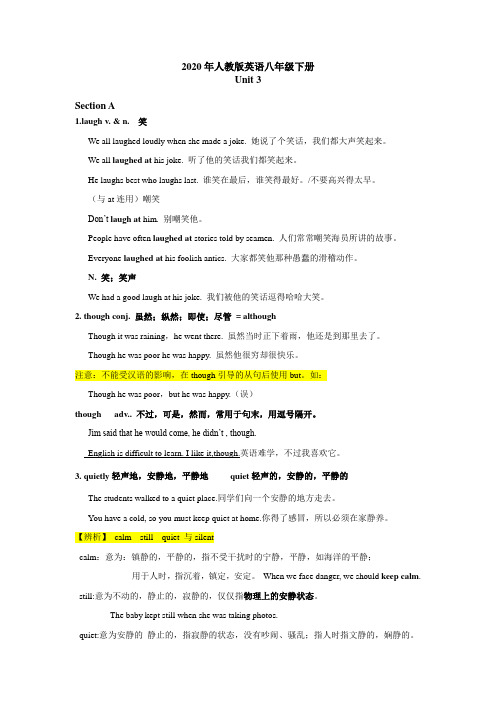
2020年人教版英语八年级下册Unit 3Section Augh v. & n. 笑We all laughed loudly when she made a joke. 她说了个笑话,我们都大声笑起来。
We all laughed at his joke. 听了他的笑话我们都笑起来。
He laughs best who laughs last. 谁笑在最后,谁笑得最好。
/不要高兴得太早。
(与at连用)嘲笑Don’t laugh at him. 别嘲笑他。
People have often laughed at stories told by seamen. 人们常常嘲笑海员所讲的故事。
Everyone laughed at his foolish antics. 大家都笑他那种愚蠢的滑稽动作。
N. 笑;笑声We had a good laugh at his joke. 我们被他的笑话逗得哈哈大笑。
2. though conj. 虽然;纵然;即使;尽管= althoughThough it was raining,he went there. 虽然当时正下着雨,他还是到那里去了。
Though he was poor he was happy. 虽然他很穷却很快乐。
注意:不能受汉语的影响,在though引导的从句后使用but。
如:Though he was poor,but he was happy.(误)though adv.. 不过,可是,然而,常用于句末,用逗号隔开。
Jim said that he would come, he didn’t , though.English is difficult to learn. I like it,though.英语难学,不过我喜欢它。
3. quietly轻声地,安静地,平静地quiet轻声的,安静的,平静的The students walked to a quiet place.同学们向一个安静的地方走去。
- 1、下载文档前请自行甄别文档内容的完整性,平台不提供额外的编辑、内容补充、找答案等附加服务。
- 2、"仅部分预览"的文档,不可在线预览部分如存在完整性等问题,可反馈申请退款(可完整预览的文档不适用该条件!)。
- 3、如文档侵犯您的权益,请联系客服反馈,我们会尽快为您处理(人工客服工作时间:9:00-18:30)。
八年级下Unit3单元检测卷I. 单项填空(15分)l. -Could you please ________ your schoolbag? It’s too dirty.-Sure.A. washedB. washingC. washD. to wash2. –Please ________ your brother when I'm on business. -My pleasure.A. look atB. look upC. look likeD. look after3. -Lucy, do you like playing basketball? -No, I ________ it.A. hateB. needC. forgetD. enjoy4. -Could you help me with the math problem?-________. I'm too busy now.A .Yes, please B. No, sureC. Yes, you couldD. Sorry, I can't5. Anna ________ me ________ her party last night.A. invited; forB. invited; toC. inviting; toD. inviting; for6. - Could you get me some tea? -________.A. That's rightB. You're rightC. That’s all ri ghtD. With pleasure7. -Ann, could you ________ the rubbish? -Sure. I'm coming.A. come outB. give outC. take outD. go out8. The government provided the homeless people ________ food and clothes.A. inB. withC. ontoD. to9. - How long have you lived in the new flat? - ________ 2010.A. InB. AfterC. SinceD. Before10. -Could I ________ your iPad, Alice?-Of course. Here you are.A. lendB. keepC. borrowD. return11. - I'm not going swimming tomorrow afternoon.-________. I have to clean up my bedroom.A. So am IB. Neither am IC. Neither I amD. So I am12. -Can you finish ________ these books before 10 o'clock? -Yes, I can.A. to readB. readC. readsD. reading13. She got up early this morning ________ she could catch the first bus.A. in order toB. in order thatC. all thatD. whether14. Man's understanding of nature is developing ________. It never stays at the same level.A. at the right timeB. for the first timeC. at the same timeD. all the time15. ________ the children have fun, parents can take dance lessons on the beach.A. AlthoughB. IfC. WhileD. OnceⅡ. 完形填空(15分)A farmer had some little dogs to sell. As he was putting up an advertisement on the fence of his yard, a 1________ happened to pass by.“I want to ________2 one of your dogs, sir.”“Well, " said the farmer, "these dogs come from fine parents and cost a lot of ________3.”The boy ________4 his head for a moment. Then he reached deep into his ________5 and pulled out some change. “I've got thirty-nine cents(美分). Is that ________6 to take a look?”“________7," said the farmer. And with that he let out a whistle(口哨),“Here, Dolly!”Dolly ran out of the dog house ________8 by four little dogs. The boy's eyes danced with joy.As the dogs made their way to the fence, the little boy noticed something else moving inside the ________9. Slowly another little dog ________10 : this one much smaller. It was doing its best to ________11.“I want that one, "the little boy said.The farmer said, "Boy, don't want that dog. He will ________12 be able to run and play with you like the other dogs would.”The boy rolled up(卷起)one leg of his pants and showed a steel(钢)________13. Looking back up at the farmer, he said, “You see, sir, I don't ________14 too well myself, and he will need someone who ________15.”1. A. boy B. dog C. farmer D. son2 A. sell B. see C. buy D. feed3. A. time B. money C. work D. study4. A. shook B. covered C. knocked D. dropped5. A. pocket B. yard C. heart D. mouth6. A. enough B. easy C. necessary D. simple7. A. No B. Sure C. Sorry D. Thanks8. A. sent B. driven C. followed D. taught9. A. farm B. fence C. advertisement D. doghouse10. A. died B. shouted C. appeared D. watched11. A. catch up B. go away C. give up D. look out12. A. sometimes B. always C. often D. never13. A. hand B. back C. arm D. leg14. A. speak B. run C. jump D. swim15. A. asks B. understands C. thinks D. succeedsIII. 阅读理解(每题2分,共30分)AWe know that many animals do not stay in one place. Birds, fish and other animals move from one place to another at a certain time. They move for different reasons: most of them move to find food more easily, but others move to get away from places that are too crowded.When cold weather comes, many birds move to warmer places to find food. Some fishes give birth in warm water and move to cold water to feed. The most famous migration(迁移)is probably the migration of the fish, which is called "salmon". This fish is born in fresh water but ittravels many miles to salt water. There it spends its life. When it is old, it returns to its birth place in fresh water. Then it gives birth and dies. In northern Europe, there is a kind of mouse. They leave their mountain homes when they become too crowded. They move down to the low land. Sometimes they move all the way to the seaside, and many of them are killed when they fall into the sea.Recently, scientists have studied the migration of a kind of lobster (龙虾). Every year, when the season of the bad weather arrives, the lobsters get into a long line and start to walk across the floor of the ocean. Nobody knows why they do this, and nobody knows where they go.So, sometimes we know why humans and animals move from one place to another, but at other times we don’t. Maybe living things just like to travel.1. Most animals move from one place to another at a certain time to ________.A. give birthB. find beautiful placesC. find food more easilyD. enjoy warmer weather2. The fish called "salmon" spends a long time in ________.A. salt waterB. its birth placeC. fresh waterD. rivers3. The mice in northern Europe move when ________.A. they give birthB. the place gets too crowdedC. they haven’t enough foodD. the weather is bad4. The lobsters move ________.A. to find more foodB. at a certain timeC. to the underseaD. to the fresh water5. What is the main idea of the passage?A. The migration of the fish called "salmon" is the most famous migration.B. Animals move to find food more easily.C. Living things move from one place to another because they like to travel.D. Sometimes we know why and how living things move from one place to another, butsometimes we don't.BJia Zuosheng, 27, used to work as a security guard (保安) at the library of Tsinghua University. But a few months ago, he became a college student in Lishan College in Shandong and he studies math there now. When hearing this news, many people were surprised. On school opening day, many reporters waited outside the school gate to interview him.“I was born in a poor village in Shandong Province," said Jia. "Our village has never had a college student. Most boys work in town after growing up. I failed the National College Entrance Exam(高考)twice. Then I want to Beijing to find jobs. In the following years, I went on studying by myself whi le working.”At the end of 2009, Jia found a job as a security guard at the library of Tsinghua University.“I cherished (珍惜) the job very much because it gave me a good chance to read books," Jia said.“Iusually worked at night so I had ple nty of time to study in the daytime.” When he had problems that he couldn't work out, Jia asked the students at Tsinghua for help. "My dream is to be a college teacher. So I need further education. That's the reason why I took the National College Entrance Exam again," Jia said. “I wish to educate students with my knowledge and love and help them enjoy true, kind and beautiful thi ngs.”Jia's mother said Jia has always been independent(独立的)and knows what he wants. But she has other worries. "It's difficult to find such a good job at present as a library guard in Tsinghua University. I'm not sure if this is a right decision.”“I will never regret(后悔),”said Jia. "Everyone will have a new start. It's the end, and the beginning.”6. Jia used to ________.A. work in Tsinghua University as a math teacherB. be a security guard at the library of Tsinghua UniversityC. study in Lishan CollegeD. be a reporter writing for a newspaper7. Jia took the National College Entrance Exam again because________.A. there was no college student in his villageB. he didn't want to work in the town after growing upC. he needed further education to achieve his dream of becoming a college teacherD. he wanted to find a job as a guard in Tsinghua University8. According to the passage, Jia finally became college student ________.A. because he never gave up studying in his free timeB. because he was vey luckyC. because of his mother's loveD. because he failed many times in the past9. Which of the following sentences is WRONG?A. Jia studied by reading books in the library.B. When he met some problems, he always asked the students at Tsinghua for help.C. Jia thinks this is a right decision and a new start of life for him.D. Jia thinks it's difficult to find a good job in the future.10. What is mainly talked about in the passage?A. Jia Zuosheng is working as a security guard at the library of Tsinghua University.B. Jia Zuosheng wants to find a good job in the city.C. A security guard achieved his dream by studying in college.D. A security guard took part in the National College Entrance Exam.CAlmost every Chinese person can recite the two lines of the famous poem: “Every grain on the plate comes from hard work(谁知盘中餐,粒粒皆辛苦).”But sadly, many of us don't actually get the real meaning of these lines: Don't waste food.A CCTV program, News One Plus One, reported that food Chinese people throw away every year is enough to feed 200 million people for a year.Do we have too much food? No, according to the UN World Food Program, there were 925million hungry people around the world in 2010, especially in developing countries. Six million children die of hunger every year.Chinese people are well known for being generous (慷慨的). Many even feel that they lose face if their guests have eaten all the food on the table.Luckily, a number of people have realized the importance of saving food. Last November, Li Hong, a waitress in a restaurant in Nanjing, got fired(开除)because she took some leftover(剩余的)food home for her son. Many people stood by her side and agreed that it was not right to waste food.What should we do in our daily life to waste less food? Here are some tips:◆Do not order too much in a restaurant. Only order what you want to eat. If you cannot eat all the food you ordered, take the rest of it home.◆Don't be too picky(挑剔的)about food. Some food may not taste great. But your body needs it.◆Keep an eye on what food you have at home. Don't buy too much, especially for vegetables and fruit.11. According to News One Plus One, Chinese people ________.A. save enough food to feed 200 million people for a yearB. throw away lots of food every yearC. get enough food to feed millions of people every yearD. have to feed 200 million hungry people every year12. From the third paragraph, we know that ________.A. we have too much food to feed people in the worldB. there were 925 million people in developing countriesC. because of hunger, six million children die every yearD. there are only a few people getting hungry every year13. From the fourth and fifth paragraphs, we can conclude(得出结论)that ________.A. all Chinese people are generousB. Chinese people always waste foodC. Li Hong got fired because she wasted foodD. everyone should get into the habit of saving food14. What should we do to save food in our daily life?A. When we order too much food in a restaurant, just take the leftover food home.B. Eat more food that doesn’t taste great.C. We should not buy vegetables and fruit.D. We should keep an eye on the food we like.15. What's the main topic of the passage?A. Don't waste food.B. Many people die of hunger.C. Don't be picky about food.D. Eat all the food you order.IV. 补全对话(5分)A: Hi, Liu Mei. I haven't seen you for a long time. 1________ these days?B: I have been a member of the school volunteer project. 2________?A: Of course, but I don't know what I can do.B: 3________?A: Playing the guitar.B: Well, you could help 4________ for little kids.A: Good idea! 5________.B: You're welcome.V. 根据汉语提示完成句子,每空一词(10分)1.为了取得好的成绩,我在学习上花费了大量的时间。
